How to Teach a Child With a Speech Disorder How to Read
"Statistically, more American children suffer long-term life-damage from the procedure of learning to read than from parental abuse, accidents, and all other childhood diseases and disorders combined. In purely economic terms, reading related difficulties cost our nation more than the war on terrorism, law-breaking, and drugs combined. "We need to reconceptualize what information technology means to learn to read and who's responsible for its success if we're going to bargain with the problem." – Dr. Grover Whitehurst, Managing director Institute of Education Sciences, Assistant Secretary of Education, U.S. Department of Pedagogy (nine-10-03 Children of the Code interview).

Spoken communication impairments such as apraxia in themselves are not cerebral nor receptive disorders. However merely as some may need specific therapies and strategies to learn to talk, some of the aforementioned or other multisensory strategies can be used to help them learn to read, also as other bookish skills. Having a speech impairment such equally apraxia can create developmental lags in linguistic communication which may affect reading and writing. Yet equally we are seeing, when provided the hazard, these children are able to brand over a year'south gain in a year'due south fourth dimension. Practise not underestimate them as they may not just make it, they may excel above neurotypical students if given the take a chance. At that place may not be potent evidence in this yet, however through the Cherab Foundation there has been strong anecdotal feedback in this expanse for over a decade now. There will probably be more than evidence once at that place is more advocacy for the verbal disabled. And as with other impairments, we may learn there are benefits to speech disorders.
Super Memory For Many That Are Exact Disabled From Childhood
I first noted with my ain son Tanner, and have heard from many others, that children with apraxia or other severe impairments of speech similar it, appear to have an unusual phenomenal recall from every bit young every bit 2 years old. They say there are gifts in whatsoever disability. For example from a 2012 article from Scientific American "It'southward an often-repeated thought that blind people tin compensate for their lack of sight with enhanced hearing or other abilities. The musical talents of Stevie Wonder and Ray Charles, both blinded at an early age, are cited as examples of blindness conferring an advantage in other areas. And then at that place'due south the superhero Daredevil, who is blind but uses his heightened remaining senses to fight law-breaking.
It is commonly assumed that the comeback in the remaining senses is a result of learned beliefs; in the absence of vision, bullheaded people pay attention to auditory cues and learn how to apply them more efficiently. But there is mounting evidence that people missing ane sense don't just acquire to use the others better. The brain adapts to the loss by giving itself a makeover. If one sense is lost, the areas of the encephalon commonly devoted to handling that sensory data do not go unused — they get rewired and put to piece of work processing other senses.
A new written report provides evidence of this rewiring in the brains of deaf people. The study, published inThe Journal of Neuroscience, shows people who are born deaf utilize areas of the encephalon typically devoted to processing audio to instead procedure impact and vision. "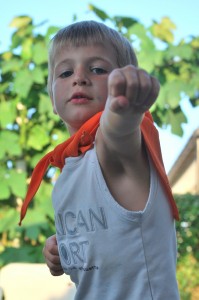 I believe the "gift" of late talking is a superior retentivity.
I believe the "gift" of late talking is a superior retentivity.
Here are some common examples yous may see in a preschool child every bit reported through the Cherab Foundation.
- Y'all tell your 2 year old, "no more than cookies this evening. Tomorrow you can take some other cookie" The next morning that child wakes up and goes to the identify you keep the cookies and points. O
- You lot drive someplace once and the side by side time you get in that location they point out which way to go next on the route.
- Your child is playing with something y'all want to take away, typically you can find another toy to play with they'll drop what they are doing to play with the toy you establish. They'll transition nicely to the new toy, merely as y'all get up to leave with the original toy behind your back they'll point or go behind your back because they saw what you did and didn't forget about the original toy.
All of these examples are developmentally uncharacteristic for ii and three years olds who typically accept short attention spans.
Every bit they age the unusual memory persists which can be a huge benefit in academics. There may be a number of theories as to why this is happening in this population. Perhaps while others their age are able to babble and talk virtually annihilation that comes to mind, they have to recall what they want to communicate long enough to figure out how to get their needs met. Perhaps information technology's due to using a different pathway and developing such pathway -they take an border we don't yet sympathize. No matter the reason, having a great memory is ane of the signs of a gifted student. Appreciation of this power may be able to provide more effective academic strategies for pedagogy this population of students.
Academics And Apraxia
A common business organization among parents of preschool children with speech communication impairments such as apraxia is that their child doesn't appear to recall their colors and numbers which they previously mastered. This is in stark dissimilarity to the superior retentiveness just discussed. At that place again tin be numerous reasons for this including a basis in motor planning and feeling force per unit area. With motor planning, the problem is performing on command. So in other words when asked information technology may go more difficult. Every bit higher academic abilities are expected at younger and younger ages in children, information technology should be noted that children during preschool age with speech impairments should be provided the benefit of the doubt. Children with special needs such every bit apraxia are working hard learning how to communicate in almost daily sessions of speech and occupational therapy. They are probably as well in therapy for hypotonia, sensory and/or motor planning deficits. There is potent evidence that learning academics early instead of later makes no deviation in the long run. Mayhap fifty-fifty more noteworthy is that there is besides evidence that too much academic pressure prior to half dozen or seven years old can be detrimental Here are some research reasons to delay kindergarten when there is a special need.
Those children who read early on are no farther forth than those who read subsequently. School work could and should take a dorsum seat to therapy during preschool years.
Learning To Read At 7 Is Not Late
Just as the research recommends once my son Tanner did start kindergarten at vi years former he was one of the meridian in his mainstream class according to his teacher. Information technology's of import to call back that communication needs become increasingly circuitous, and every bit the child with a speech impairment ages, schoolhouse demands get from uncomplicated during kindergarten, to difficult, all inside a relatively short menstruum of time. Once a child breaks downwards in their ability to keep up, they may continue to fall further behind as their peers move on. Years ago in the United States, students in kindergarten students were not expected to be able to read in kindergarten, only to be reading prepare. The push for younger and younger academics goes against the testify for all students, but particularly more so for the ascent number of students with communication impairments.
Between the hours spent in intensive therapy, and stress from not being able to communicate simple needs, many children in preschool years don't accept time to exist a child. It'south of import not to underestimate the importance of play. As the Cambridge University led review which recommends not starting kindergarten until 6 years old states 'Children have a right to be children' And when they are ready they can soar ahead.
 My son Tanner started reading over the summer when he turned 7. His first favorite book was "Hop on Popular"
My son Tanner started reading over the summer when he turned 7. His first favorite book was "Hop on Popular"
Through the McKay Scholarship in Florida, after one year in a mainstream kindergarten, we switched Tanner and his brother to the Pine School, a private school. When Tanner started outset grade he was the just 1 in his class who was a beginner reader as most of his friends now were fluent readers since kindergarten. Tanner was one of the merely children with a spoken communication harm in this school. In spite of the fact that Tanner didn't start working on reading skills until later -Tanner was a directly A pupil in all subjects. Information technology took lots of difficult piece of work, but Tanner rose to the challenge. Read Enquiry Reasons To Delay Kindergarten.
Multisensory Tips For Teaching A Child With Apraxia
The Learning Disability Association emphasizes that no single reading method will be effective for all students. This folio contains useful data from the LDA regarding multisensory structured language programs both content and principles of Educational activity. In that location are also less traditional ways to help at dwelling house.
Back Writer: In addition to newspaper, when teaching a child to spell a discussion, write the letters on their back and have them say each i out loud.
Game Show: Take turns beingness the contestant and game show host on a Spelling Bee "prove". We'd jump upwardly and down and act just like they do on game shows. Everyone in my family would take turns playing the game and if Tanner was a contestant all of us except Tanner would spell the answers wrong so that Tanner was the ane contestant to spell it right and win. If Tanner was the game show host, one of u.s. would get it right, but the rest would spell it wrong. Nosotros would try to spell the discussion in a style most would misspell it. This would make Tanner express joy and he had to right united states of america.
Teacher: Just similar the game show we'd also play school and take turns being the teacher or the student. Most times Tanner was the instructor and I'd exist the educatee who would always spell the word wrong. Tanner would take to teach me most silent messages, every bit well as why certain letters brand various sounds. As many times as I got it wrong, he'd laugh each fourth dimension.
The Rhyme Game: Nosotros would sit at dinner and I would say "Let's play a game. I'm going to say a word and everyone alter one alphabetic character to brand another word" Nosotros'd become around the table and each person would play or pass. Yous can too do this using actual letters, merely I recommend refrigerator magnet letters on a magnetic white lath. They are fairly cheap and so you can play in the automobile also. Information technology took my son with apraxia awhile to want to play. For the longest time he just sat and listened to and watched us, but as fourth dimension went on he joined in the fun. Other rhyming activities include children'southward rhymes such every bit Itsy Bitsy Spider, books like those by Dr. Seuss, and music with rhymes such as Kidsongs The Name Game.
Intermission It Downwards: Even though Tanner would spell each word correctly i at a time when the same words were put in a sentence he broke downward and spelled words he knew incorrectly. Just like when he learned to speak the longer the utterance the more the difficulty information technology appeared. So I used the same motor planning strategies I had learned helped him in speech therapy. Once I told him to call up of each word separate he would spell them correctly. And the same went for individual words. When Tanner first started reading more than circuitous words, such as for case, 'circulatory', he would require a cue to interruption it down. He started to come upwards with his own motor planning tips afterwards awhile. I would say, "Simply break information technology down Tanner and call back of it as 4 words" Tanner would spin a wheel, or handclapping his hands, or another motor planning trick to break it downwards.
Cue The Reading: There are times the child'southward speech harm can inhibit their power to read sure words out loud. I found that if I used the classic motor planning strategy we used for speech, I clap my hands, or provide a similar motor planning cue, he'd be able to say it correctly. Once he did say the word correctly I'd have him repeat it at least 3 times telling him to assistance go it into his motor retentivity. As time went on he was able to cue himself when needed.
 Conviction Books: Again Dr. Seuss books were ver popular in my abode and I institute them to be excellent for my son with apraxia. Even if information technology'south a memorized volume, it's good for a child with apraxia to accept what I call a confidence book that they tin read.
Conviction Books: Again Dr. Seuss books were ver popular in my abode and I institute them to be excellent for my son with apraxia. Even if information technology'south a memorized volume, it's good for a child with apraxia to accept what I call a confidence book that they tin read.
Before your child can read at all, I recommend a book called 'Hug' by Jez Alborough. Almost every page has 1 word on it, the word"Hug" which can be said in all different ways with different voices and meanings.
When my son was learning to read at 7, he'd like to turn the pages of the book Hug and read to us. At starting time, he just read the word the aforementioned way throughout and and then he started to become creative with how he said the give-and-take hug. To build confidence you can comment on "how advanced" your child is to be able to "read an entire book!" likewise maxim "Await how big of a book it is!" This is why Hug is a bully conviction book for warming up.
As your kid progresses and so do their confidence books. For my son Tanner, after Hug was Dr. Seuss, and so Danny and the Dinosaur. The warm up of today volition be your child's "hard" book of yesterday. For apraxia I constitute providing a warm-up book first seemed to assistance with motor planning for the more complex books, however, all children do good from confidence.
Sound Model Reading: Later my son read his conviction volume solitary, we'd read a more than difficult book together. I would let my son attempt to sound out the words, simply by and large I would read a judgement at a time and accept him repeat it back as I pointed to each word. I would do this equally a model, similar to what we practise with speech therapy for voice communication. Based on the research about those with severe speech impairments or stroke who couldn't talk simply could sing, I would utilise a fun singsong voice when reading. I would also use creative voices, remember cartoon character voices, and because I used to work in the animation industry this was correct up my ally too! I took the focus off reading and put it onto 'how' it was read. If he was stumbling on reading I would say "read with feeling" and while he worked on how he read it I noted his reading ability improved. I would compliment the manner he was reading "Wow you can be an actor y'all read that so well!". It appears to be a manner to trick the brain into using some other area. In that location are numerous actors with speech impairments like stuttering who are able to read and memorize scripts and talk perfectly! Some of these include Bruce Willis, James Earl Jones, Julia Roberts.
Famous People Who Stutter
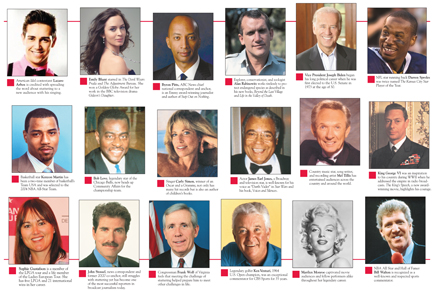
Fun With Messages: They're, their, there…are some things in the English language that but don't make sense. My son Tanner came abode from schoolhouse one day so upset because he didn't understand why they're, their, and there were all spelled differently, but pronounced similar with very different meanings. He threw his volume in frustration and said at the fourth dimension "dare, cartel, dare, stupid, same matter!" Instead of correcting him, I agreed with him. I picked upwards his book and said, "Tanner you lot are absolutely right. It is stupid that these words sound similar and have three very different meanings. They should be three different words. However, unlike all the other students you have a head'due south upward on this that they don't. You have a phenomenal memory! So while other kids have to learn it, you lot don't accept to. All you accept to practice is remember that when…" And from there I taught him very simply the departure betwixt the three. He never mixed them up once more.
For silent letters I'd tell my son, "like you they are learning to talk and want to be there with their friends, the other letters who brand lots of sounds" or "The H has apraxia and is nevertheless learning to talk, but y'all'll hurt it's feelings if yous forget he's there." Using tricks like this will profoundly reduce frustration on both their cease and yours and you are able to work with what they know.
Closed Caption
Used closed explanation on all of your TVs fifty-fifty if your child isn't watching it. Research has institute that the younger siblings or deaf children read earlier. Here is a prune of some of the research
Despite a decade of extensive research linking the use of video subtitles to improved children's reading skills, the majority of teachers and schools remain unaware of the potential, and what is a significant opportunity to overcome poor reading skills in the classroom
There has been so much successful research into the many benefits and uses of subtitles and captions on video and Goggle box that the American government has recognized the demand for subtitles and captioning, and important laws accept been passed which mandate its availability.
That inquiry has demonstrated that the benefits of subtitles and captions include:
- Subtitles and captions help children with give-and-take identification, pregnant, conquering, and retentivity.
- Reading subtitles is motivating to reading.
- Subtitles and captions can assistance children establish a systematic link between the written word and the spoken discussion.
- Pre-readers, past becoming familiar with subtitles and captions, will have familiar signposts when they brainstorm reading print-based cloth.
- Subtitles and captions have been related to higher comprehension skills when compared to viewers watching the aforementioned media without them.
- Children who have a positive feel in reading will want to read; reading subtitles and captions provides such an experience.
- Reading is a skill that requires practice, and practise in reading subtitles and captions is exercise with accurate text.
- Subtitles and captions provide missing information for individuals who have difficulty processing oral communication and auditory components of the visual media (whether this difficulty is due to a hearing loss or a cognitive delay).
- Students often need help in learning content-relevant vocabulary (in biology, history, literature, and other subjects), and with subtitles and captions they run across both the terminology (printed word) and the visual image.
- Subtitles and closed captioning is essential for deafened and difficult of hearing children.
- Subtitles and captions tin exist very beneficial to those learning English as a Second Language.
- Subtitles and captions tin help those with reading and literacy issues, and can assistance those who are learning to read.
The start Inquiry formally published by the Department of Teaching in the The states in January 2013 into the link between the use of substitles on video and the ability to ameliorate childrens Reading and Literacy skills.
http://files.eric.ed.gov/fulltext/ED538460.pdf
Profiting from empowerment
International Journal of Education and Development using Information and Communication Engineering science (IJEDICT). Vol. ane; Issue. 4, pp. 18-29.
http://ijedict.dec.uwi.edu/viewarticle.php?id=74&layout=html
Same-Language-Subtitling (SLS): Subtitled Music Video past Wayne Greg McCall
http://editlib.org/noaccess/32054
E-Karaoke Learning for Gender Empowerment in Rural Republic of india
Data and Communication Technologies and Evolution, 2006. ICTD apos;06.
http://www.academia.edu/363716/E-Karaoke_Learning_for_Gender_Empowerment_In_Rural_India
Karaoke for social and cultural change
Journal of Information, Communication and Ethics in Guild. Vol. 4; Issue.3, pp 121-130.
http://www.academia.edu/363715/Karaoke_for_Social_and_Cultural_Change
Enquiry Documentation (PlanetRead) Dr. Brij Kothari
https://www.planetread.org/images/pdf/research/SLS_on_TV_in_India.pdf
https://spider web.archive.org/web/20140905022608/https://www.planetread.org/pdf/SLS_Impact_Study_Jan_2_2008_Literacy.pdf
Can India's "literate" read? – Research Article Brij Kothari – 2011 –
http://www.planetread.org/pdf/Can%20India's%20'literate'%20read.pdf
Overview Commodity (2008)
http://www.planetread.org/pdf/Let%20a%20Billion%20Readers%20Bloom_International%20Review%20of%20Education_Lite.pdf
Bear on Study – Aforementioned Language Subtitling on TV:
Impact on Basic Reading Development among Children and Adults(2007, Draft)
http://www.planetread.org/pdf/SLS_Impact_Study_Jan_2_2008_Literacy.pdf
Aforementioned Language Subtitling: Research Summary (2007) – Some Primal Findings
http://world wide web.planetread.org/pdf/Enquiry%20Summary_SLS.pdf
Research Article (2004) – SLS on Television in India
http://world wide web.planetread.org/pdf/SLS_on_TV_in_India.pdf
Research Article (2002) – SLS: a butterfly for literacy?
http://www.planetread.org/pdf/Journal%20of%20education.pdf
U.S. Research Studies I & Ii of the AVAILLL Program
http://www.availll.com/pdfs/abstractsEachStudy.pdf
Motion-picture show-based programme a boost for struggling readers' literacy
http://www.availll.com/pdfs/newsRelease.pdf
The AVAILLL plan: Using popular film subtitles to heighten literacy outcomes for youth offenders (New Zealand)
http://www.availll.com/pdfs/BEEBY%20Report%2022March%202012.pdf
The Availll Queeensland Written report (Australia)
http://www.availll.com/pdfs/Queensland%20Study.pdf
Raising Adolescent Reading Accomplishment – The Use of Subtitled Popular Movies & Loftier Interest Literacy Activities
http://availll.com/pdfs/Raising%20Adolescent%20Reading%20Achievement.pdf
Implementing the AVAILLL Literacy Programme at Wesley College, Auckland New Zealand in 2012
http://availll.com/pdfs/Wesley_College_Year_9_Report.pdf
Closed Captioned TV: A Resources for ESL Literacy Instruction.
http://www.dcmp.org/public_content/caai/nadh210.pdf
Furnishings of Watching Captioned Movies on Vocabulary Development of EFL Learners
The Turkish Online Journal of Educational Engineering
http://www.tojet.net/articles/v8i2/824.pdf
On-Screen Print: the role of captions as a supplemental literacy tool
http://www.appstate.edu/~koppenhaverd/rcoe/f10/6575/read/linebargeretal10.pdf
Adult literacy: captioned videotapes and word recognition
http://dl.acm.org/citation.cfm?id=919689
The Result and the Influence of the Use of Video and Captions on Second Language Learning
http://search.informit.com.au/documentSummary;dn=997746379301329;res=IELNZC
Television Literacy: Comprehension of Program Content Using Closed Captions for the Deaf
http://jdsde.oxfordjournals.org/content/6/1/43.curt
Articles
Watch and learn – How music videos are triggering a literacy boom
http://www.boston.com/bostonglobe/ideas/manufactures/2010/09/19/watch_and_learn/
Hollywood helps kids to read
http://world wide web.nzherald.co.nz/nz/news/article.cfm?c_id=one&objectid=10884425
ILove Subtitles Blog
http://iheartsubtitles.wordpress.com/tag/education/
Read Captions Across America!
http://www.dcmp.org/ai/readcaptionsacrossamerica/articles_read_captions_across_america.html
Educators Flocking to Republic of finland, Land of Literate Children
A 1991 worldwide study of 9-year-olds found that Finnish students read the best. One reason is that Republic of finland produces few television programs of its own. Children learn from drawing subtitles, flashing so quickly that word recognition, not sounding out, is the only style to read.
http://world wide web.nytimes.com/2004/04/09/world/suutarila-journal-educators-flocking-to-finland-state-of-literate-children.html?scp=1&sq=Republic of finland+-+reading+-+subtitles&st=nyt
Airtight Captioned Television: A New Tool for Reading Pedagogy
http://world wide web.tandfonline.com/doi/abs/x.1080/19388078509557842
Captioned Video and Vocabulary Learning: An Innovative Practice in Literary Instruction
http://www.appstate.edu/~koppenhaverd/rcoe/f10/6575/read/koskinenetal93.pdf
Television Captioning: A Vehicle for Accessibility and Literacy
http://www.dinf.ne.jp/doc/english language/Us_Eu/conf/csun_99/session0057.html
Using boob tube for literacy skills
http://www.audaciousideas.org/2008/02/using-television-for-literacy-skills/
VIDEOS
See ex-President Bill clinton recognising the research and work of Dr.Brij Kothari into the employ of subtitles on video to ameliorate children's Reading and Literacy skills in India.
http://youtu.be/juZOlmf9APk
Brij Kothari explains in this video how he uses subtitled karaoke video to assistance the 300 1000000 or so Indians who tin can't read or write. It's sorry that people in Republic of india can have advantage of this research, all the same there is so little awareness of this opportunity & benefits in classrooms and schools in the U.S.
http://youtu.be/K7XDMzsLd5o
Captions, English subtitles that also depict sounds, are essential for Deafened and hearing impaired students and improve comprehension for ESL students, struggling readers and children with learning disabilities. They are already bachelor on many DVDs, online videos and Idiot box shows used in grade.
http://youtu.be/AT_IV6KL53A
Dr. Scott Hollier from Media Access Commonwealth of australia gives a presentation on web and application accessibility to the Australian Dissemination Corporation
http://www.youtube.com/watch?v=ThzAJs0nLxM&
Attain Every Viewer with Captioning
http://youtu.be/1XST8LnzU6o
OTHER WEBSITES
How TV Captions Help Learning to Read
http://www.captionsforliteracy.org/how_captions_help_learners_to_read.htm
Captions in the classroom: a hidden literacy tool
http://www.mediaaccess.org.au/latest_news/captions/captions-in-the-classroom-a-subconscious-literacy-tool
A wealth of research on this here
Motor Planning To Reading Games
For long words, we'd break it up into smaller words. We'd utilise the same visual or auditory cues to teach long words in reading that nosotros used to teach long words in speech such as clapping, moving fingers for each sound. If for instance, your child is trying to read the word "snug" don't break it down to the letters s -due north -u- g. Instead, break information technology downwardly into "Sn" "u" "thou" and use a motor planning cue such as moving one finger for each of the three sounds.
Here are a few games you tin can utilise with the to a higher place strategy to aid with the motor planning needed to read. Let your child physically push the various letters or sounds together as they make each sound.
Three-Letter of the alphabet Words Puzzle Card
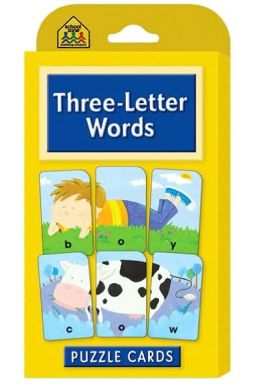 Three-Letter of the alphabet Words Puzzle Cards evidence images and letters that children put together in sets of three. Each correct match-up creates a fun-filled picture and spells a word. There are 36 sets of iii-letter words.
Three-Letter of the alphabet Words Puzzle Cards evidence images and letters that children put together in sets of three. Each correct match-up creates a fun-filled picture and spells a word. There are 36 sets of iii-letter words.
Repurposing Legos into beginning spelling/reading aids
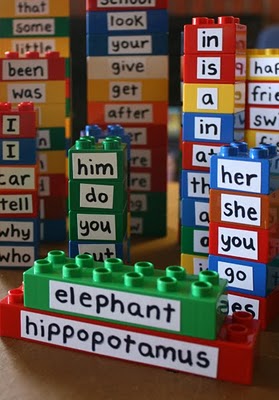
From the website "All I did was sit down ane evening with a agglomeration of white stickers and write out a load of easy words. Sight words and words that my kids tin can already read or sound out. It took a while to write and cut them all, but it was very cheap, and we were lucky plenty to have a mate we'd non seen in years staying with us that dark, so we all saturday around and chatted until about 3 am while I stuck all these words on the blocks. For some of them I put the opposites on the other side of the block, similar "love" and "hate" or "large" and "small" and for others I put complimentary words like "his" and "her", so that the kids could change sentences they made easily by switching around a cake. I had a couple of long blocks, so used them for entertaining long words."
Use Toys To Spell
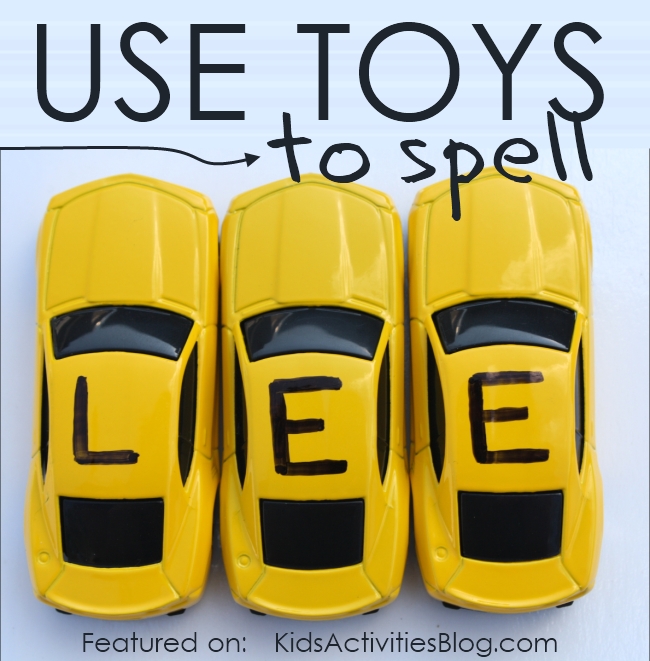
Equally featured on the KidsAcitivitesBlog you can as they suggest write with a sharpie marker onto toy cars that your kid can push together, or adhere pieces of paper to the tops of the cars as y'all did with the Legos where you can even add brusk words to put together chemical compound words or even sentences depending on the complication your child needs.
Shake Of The Mean solar day
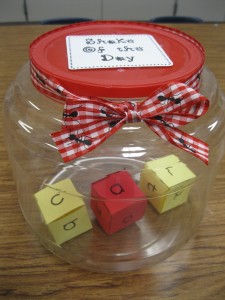
From the website:
What are some other "Shake of the Day" ideas:
- Shake all vowels
- Milk shake two words that rhyme
- Milk shake a picture and the letter of the commencement audio of that picture
- Addition or Subtraction
- three numbers in a row/example four, 5, 6
- 3 dots / 3 / three
Video Gaming As Motivation
Fifty-fifty though the inquiry has validated that video gaming may help with motor, and hand centre coordination, I have plant video gaming is highly motivational for reading and writing (typing) for various games as well. Some other plus is if you accept a child with a voice communication damage, video gaming is a great style for children or adults to socialize today that doesn't accept much speech. More information including the research here.
Their Own Road For Learning
My son Tanner has been mainstreamed since kindergarten, but every bit documented in an article for Kid'south Enabled he was interviewed for, early on he had to piece of work very hard. But it was articulate he always had his ain way of figuring things out regardless of what he was taught.
For example, in first course, Tanner's teacher said to me "Information technology's odd because developmentally children at Tanner'due south age need visual cues for math, but he doesn't. Tanner's just doing information technology in his head and I don't know how"
Of grade we all asked him how he did information technology and at offset, he would but say he didn't know. For a speech impaired kid, this could have meant anything from he didn't know to I don't know how to tell you. As his speech improved, however, he was able to tell us, and information technology had to do with his super retentiveness.
Here is an case of homework he at the time thought was "and then easy" only nobody could figure out how he was doing it. On the folio, it said 6 + vii + six = ___ Tanner looked at it and said "That's then easy it's 19" He never added up annihilation on the paper and then I said, "Tanner how do yous know it's 19?" He pointed to each of the iii numbers on the paper and said "five, 10, 15 and then 1 plus 2 plus 1" In other words he knew that at that place was a 5 in each of the three numbers so he auto knew it was xv -and to that number he added the actress 4. He was not taught this method in schoolhouse, and nobody quite knew where he learned it from.
Early on on Tanner memorized math problems similar ix + 9, eight + viii, fifty-fifty 12 + 12 etc. which is why he tested and so well. And he works around those issues he doesn't have memorized yet by using those he does. For example, if you lot say 9 + 8 -he doesn't employ his fingers like some kids exercise -he either quick thinks of 9 + 9 or 8 + 8 and then using his method either adds or takes away one to get the right answer. He seems to do this until he memorizes which in his case doesn't appear to take that long.
Ill, Stressed, Or Tired They May Break Downwards
For any special need when ill, stressed or tired there may be a regression. Sometimes those that are not aware of this may believe it's due to a learning disability or a regression. Again always best to provide the child with the benefit of the doubt, especially in light of Dr. Robert Rosenthal'south research. I have a perfect example which happened in first grade where Tanner was mainstreamed. He once more with his memory had memorized all the math tables up to 12 due to flash cards we had. This included non simply addition and subtraction, but also division and multiplication. His unabridged class had a "mad minute" on one of the beginning days of school which wasn't fifty-fifty at that fourth dimension with multiplication and division. The teacher wanted to get an thought where her class was academically. Tanner failed it because he didn't complete but a few lines of basic addition and subtraction.
I got a call from his teacher and when I heard the exam was timed I only knew they were timing him and he panicked. So when he got dwelling house I said to him "Tanner heard y'all did the mad minute in school the other twenty-four hours that's awesome!!! They know kids go nervous with being timed and as we live in Florida at present your school is getting you prepared for united states to exist on Nickelodeon's family double dare!!! If you win y'all'll become lots of cool prizes but if you lot lose that is fun also -you lot'll go to be slimed!!! Remember how good it'southward supposed to taste?!" And then we talked well-nigh it -we had a membership to Universal Studios here in Florida and so he knew all near it.
I never went over his math tables with him that night as I knew he already mastered it all. I took the pressure level off. The day the unabridged form was given the mad infinitesimal again, and not only did Tanner get 100% but told me he was the first one finished in the class.
Sparking the Motor Planning
Another strategy was to brand sure that Tanner was "on" each day prior to school. Tanner for example at one point could read a word like 'oxygen' correctly and without hesitation, merely when not warmed up volition come to a word that he typically knew and that is really like shooting fish in a barrel like 'at' and read it as "ate" instead. Or even come up to a word like 'the' and inquire "what'south that give-and-take again?" When I used to correct him he says "Oh that's right, I forgot" The kid with the amazing memory in so many other areas. Information technology was almost like a block, so I am guessing it's a motor planning block.
I never make a big deal of it as I know stress would suspension him down further, so just focused on "reading with feeling" which is the strategy I take to a higher place. Just like it was never there -he starts reading perfectly. That is until the next day when he needs another warm up to get his motor planning sparked again. Not sure if I should phone call it that- simply merely like speech at that place appears to exist some overlaps in the unusual patterns of reading. On the style to schoolhouse in elementary school, he'd read out loud at least 1 folio to get his motor planning for reading ready for school. It could be a page from the book "Puppy Puzzle" or "Harry Potter"as it didn't appear to matter. In one case his motor planning for reading was 'on' Tanner was able to read just about annihilation.
My son at 13 years old was considered a success, simply there were issues. He was mainstreamed and I no longer had him in speech therapy even though he would once in a while run across a therapist. He accepted how he spoke, and so did we. We accepted that he could communicate well enough to have friends, exist in schoolhouse mainstreamed without support, read the menu and order his own food at a restaurant. And we also knew that nobody would know Tanner had a speech consequence if he kept his answers brusk- non unless he permit his guard down and tried to talk in complex thoughts.
He had years of difficult work from 2 years old from both private and school based spoken communication and occupational therapies. From three years quondam he also was provided complimentary therapies including hippotherapy, craniosacral therapy, Vital Links Therapeutic Listening therapy. Up till this signal, the primary complimentary therapy nosotros found success with were fish oils, a nutritional strategy which he had been taking since three years erstwhile. This was what happened when he fist started fish oils as documented in Dr. Stordy's book LCP Solution; The Remarkable Nutritional Treatment for ADHD, Dyslexia, and Dyspraxia. Up till 13, this is where our son was, and with his diagnosis, he was considered at this signal a huge success. Within one year of calculation an all natural GFCF food production, he had normalized and the following few quirks that anybody including his doctors, therapists, and teachers had previously accustomed were gone.
.My son within ane yr on had progress in and so many areas across the board that were then profound that anyone who saw him was shocked. He rapidly adult a tremendous surge in complex language, independence, and excellence in academics, grace and abilities in sports in basketball, football game to the point if yous didn't know it was him y'all'd never know it was him on that field, quick reflexes, fully developed mature abstract humor that he both understands if he hears it and knowledge in how to make others express mirth in this expanse, passion for music, involvement in current events and wanting to discuss them, tremendous growth from a stocky five human foot 7 slightly overweight child who had been on a good for you organic diet but was that way regardless to a muscular half dozen foot 1 14 yr one-time. One matter he wasn't thrilled about simply the rest of united states of america were, was that he also began to feel hurting ordinarily
Each twelvemonth he progressed up in schoolhouse and when he started loftier school he was recommended for honors classes including honors English besides. His first year he gave a verbal study in school and got an A and he just wrote to YADA near it. (clip)"I'm not in oral communication therapy. I gave a verbal report today and the teacher wrote down that I was overnice and loud and with a clear voice. Sometimes if I am tired my spoken communication messes up."
In the side by side four years, Tanner who grew to an able-bodied looking vi human foot vi remained mainstreamed in a public HS in honors placement with no IEP or accommodations for the past 4 years. He has a 3.iii GPA and is working difficult to heighten that to a iii. 5 at least. (by his senior year in HS he raised it to a iii.8) He's on debate and loves it fifty-fifty though it'due south hard for him as his speech may notwithstanding suspension down under the pressure level of competitive speaking. His goal is to become a special educational activity attorney to aid others like him going alee. Again here is his interview from Kid'south Enabled from a few years ago.
There is evidence to back up nutritional links to noesis and learning both from nutrition and peradventure even through gut leaner. According to the Society for Neuroscience,Diet and the encephalon, from March of 2003, studies revealed that diets with high levels of saturated fats actually impair learning and memory. That was a decade ago! Since then there is a growing wealth of research that links poor food choices to impaired learning and lower IQ, and good for you nutrient choices to better memory, knowledge, and higher IQ.
Tanner is non the but 1 with success stories from nutritional strategies. Above is a photo of Colton who even with a diagnosis of apraxia may be graduating speech therapy shortly according to his therapists. He is just i of a number of other children with success stories from nutritional strategies to raise all the others. Here is a video of Colton at 4.
If your child is school age and you are having IEP/bookish problems where the school professionals believe your kid is not keeping up, needs to exist held back, reclassified etc. and you don't concord, seek private testing from professionals who are knowledgeable almost verbal impairments. I accept found those that work with the hearing impaired are generally more aware and accept less stigma in assuming that verbal impairments go hand in hand with learning disabilities. Ability to verbally limited yourself and IQ practice not go hand in mitt. All i has to exercise to learn this is watch whatsoever daytime court TV testify. Likewise please look at the links for advocacy help on the Speech Therapy Matrix which was developed for school-based SLPs. Some tend to believe that the academics are unique from the original diagnosis. They may exist, only just likewise may exist directly linked to the original diagnosis or an issue over again created by a developmental lag.
Lisa Geng got her offset equally a designer, patented inventor,and creator in the fashion, toy, and film industries, only later the early diagnosis of her young children she entered the world of nonprofit, pilot studies, and advancement. Equally the mother of two "late talkers," she is the founder and president of the nonprofit CHERAB Foundation,co-author of the acclaimed book, The Late Talker, (St Martin'southward Press 2003), and is instrumental in the development of IQed, a whole food nutrition meal replacement. Lisa currently serves equally a parent advocate on an AAN lath for vaccines, and is a member of CUE through Cochrane U.s.. Lisa is currently working on a 2d book, The Belatedly Talker Grows Up and serves as a Tardily
Source: https://pursuitofresearch.org/2014/02/28/teaching-tips-for-a-speech-impaired-child/
0 Response to "How to Teach a Child With a Speech Disorder How to Read"
Postar um comentário